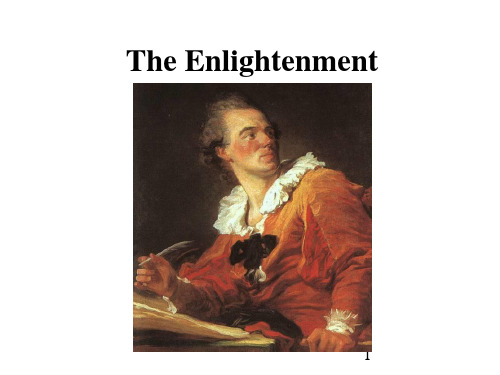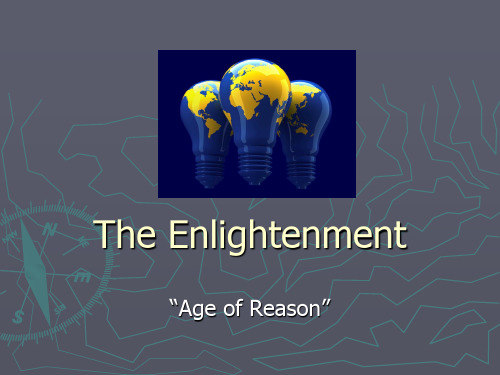最新外教英语PPT启蒙运动the enlightenment教学文稿
合集下载
外教英语PPT启蒙运动the enlightenment教学文案

• Scientific and academic thought should be secular
The Salons
In France, thinkers called philosophes (French for “philosophers”) championed the idea of reason in government.
Many Enlightenment thinkers stressed individual rights that governments must respect.
Enlightenment thinkers also felt that people should have a say in their government.
Roots of the Enlightenment
The Enlightenment grew out of the Renaissance, Reformation, and the Scientific Revolution.
What’s the same?: Like all of these other movements, much Enlightenment thinking challenged acceptey
Enlightenment: a period during the 1600s and 1700s in which educated Europeans changed their outlook on life by seeing reason as the key to human progress.
Enlightenment and Government
Enlightenment thinkers criticized accepted ideas about government. Some questioned the medieval belief in the divine right of kings [the idea that God chose a country’s king, and that the king got his authority from God.]
The Salons
In France, thinkers called philosophes (French for “philosophers”) championed the idea of reason in government.
Many Enlightenment thinkers stressed individual rights that governments must respect.
Enlightenment thinkers also felt that people should have a say in their government.
Roots of the Enlightenment
The Enlightenment grew out of the Renaissance, Reformation, and the Scientific Revolution.
What’s the same?: Like all of these other movements, much Enlightenment thinking challenged acceptey
Enlightenment: a period during the 1600s and 1700s in which educated Europeans changed their outlook on life by seeing reason as the key to human progress.
Enlightenment and Government
Enlightenment thinkers criticized accepted ideas about government. Some questioned the medieval belief in the divine right of kings [the idea that God chose a country’s king, and that the king got his authority from God.]
外教英语启蒙运动the enlightenment(课堂PPT)

What’s new?: Enlightenment philosophers wanted to use the ideas and reason of the Scientific Revolution for problems in government and society.
5
The Scientific Revolution
• Scientific and academic thought should bIn France, thinkers called philosophes (French for “philosophers”) championed the idea of reason in government.
The Enlightenment grew largely out of the new methods and discoveries achieved in the Scientific Revolution
The equatorial armillary, used for navigation on ships
4
Roots of the Enlightenment
The Enlightenment grew out of the Renaissance, Reformation, and the Scientific Revolution.
What’s the same?: Like all of these other movements, much Enlightenment thinking challenged accepted beliefs.
7
Enlightenment Principles
A meeting of French Enlightenment thinkers
5
The Scientific Revolution
• Scientific and academic thought should bIn France, thinkers called philosophes (French for “philosophers”) championed the idea of reason in government.
The Enlightenment grew largely out of the new methods and discoveries achieved in the Scientific Revolution
The equatorial armillary, used for navigation on ships
4
Roots of the Enlightenment
The Enlightenment grew out of the Renaissance, Reformation, and the Scientific Revolution.
What’s the same?: Like all of these other movements, much Enlightenment thinking challenged accepted beliefs.
7
Enlightenment Principles
A meeting of French Enlightenment thinkers
启蒙运动ppt

孟德斯鸠
Montesqui(eu1689-1755)
孟德斯鸠突破“君权神授”的观点。认为人 民应享有宗教和政治自由。认为决定法的精 神和法的内容是每个国家至关重要的。保证 法治的手段是“三权分立”,即立法权、行 政权和司法权分属于三个不同的国家机关, 三者相互制约、权力均衡。
运 动 概 况
启蒙运动概况
《
人启
教 版
蒙
高 中
运
历 史
动
必》
修
三
•
第 二 单 元
•
第 七 课
启 蒙 运 动
Enlightenment campaign
Designed by pipike
康德 Kant
(1724-1804)
用理性的阳光 驱散现实的黑暗
•思想上:文艺复兴和宗教改革运动的深入发展 •经济上:资本主义经济的发展 •文化上:近代科学的兴起,科学与知识的进步 •外交上:新航路开辟 •政治上:英法等中央集权民族国家的形成
启蒙运动 背景
The background of the enlightenment
卢梭 Roussea(u1712-1778)
法国十八世纪伟大的启蒙思想家、哲学家、教育家、文 学家,18世纪法国大革命的思想先驱,杰出的民主政 论家和浪漫主义文学流派的开创者,启蒙运动最卓越的 代表人物之一。
卢梭: 人类不平等根源是财产私有 天赋人权
谢 谢 大 家
启蒙运动 内容
The content of the enlightenment
•把斗争矛头指向天主教会和封建制度,强调理 性 •斗争的目的,既要消灭专制主义王权和天主教 的世俗势力,又要确保他们要求的政治民主、 权利平等和个人自由的制度
启蒙运动【英文】 The enlightenment

Key Vocabulary
► Enlightenment:
a period during the 1600s and 1700s in which educated Europeans changed their outlook on life by seeing reason as the key to human progress. ► Age of Reason: another name for the Enlightenment ► Salons: in France, a simple meeting of philosophers to discuss ideas during the Enlightenment ► Philosopher: a scholar or thinker ► Reason: Using logical thinking, not superstition
Think/Pair/Share
• In what new areas did Enlightenment philosophers want to use reason? • B’s share with A’s • A’s share with B’s • I will now choose someone to explain to the class. • Ans: They wanted to use reason for problems in government and society.
Think/Pair/Share
• In what ways are the periods of the Renaissance, Reformation, and Scientific Revolution similar to the Enlightenment? • A’s share with B’s • B’s share with A’s • I will now choose someone to explain to the class. • Ans: They are similar because they all challenged accepted beliefs.
Enlightenment启蒙运动英文ppt

② With the development of modern science, rationalism, as an asset Anti-feudal class provides the ideological and theoretical weapon.
Representative figures
The Enlightenment usually refers to a period between the early 18th century and the French Revolution in1789, in which new thougts were emerging . The Age of Enlightenment (or Age of Reason) was an elite cultural movement of intellectuals in 18th century Europe that sought to use the power of reason in order to reform society and advance knowledge. It promoted intellectual interchange and opposed intolerance and abuses in Church and state.
Voltaire
He was famous for his wit and for his advocacy (提倡) of civil liberties (公民自由), including freedom of religion, free trade, and separation of church and state. Voltaire was a prolific(多产的) writer, producing works in almost every literary form, including plays, poetry, novels, essays, and historical and scientific works. He wrote more than 20,000 letters and more than 2,000 books and pamphlets.
第6课《启蒙运动》PPT课件

背景 性质
继文艺复兴后欧洲第二次思想解放运动
原因: 资本主义发展较快,适应革命的需要 代表人物: 霍布斯、洛克
兴起 17 世纪的英国 发展 18 世纪后发展到法、德等欧洲国家,
中心 法国
原因 代表人物及主张
伏尔泰、孟德斯鸡 卢梭、狄德罗
主要 思想
反君主专制 宣扬自由平等
原因:君主专制阻碍了人的自然权利 理论:天赋人权和自然权利学说 新制度: 原因: 关系:
思考:从材料中可以看出卢梭的哪些思想?
提倡自由平等,反对封建专制, 主权在民,
人人享有自由平等的权利而不论其出身。人们 应自由订立社会契约,组成国家。社会中应有“共 同意志”,人人遵守。社会契约就是共同意志的体 现。代表所有人的权利与自由。这是至高无上的人 民主权,不可侵犯……当统治者要撕毁契约时,人 民有权推翻他。” ------《社会契约论》
政治上的自由是公共自由,要保障公共自由, 就应该避免把权力委托给一个人、几个人,因为 一切有权力的人都容易滥用权力,这是万古不易 的一条经验。 为此,提出一条原则,要防止滥用权力,就必 须用权力来约束权力,形成一种能联合各种权力 的政体,其各种权力既调节配合,又相互制约, 即权力要分开掌握和使用。 -----盂德斯鸠《罗马盛衰原因论》
教会制定的法律,非经政府明白批准,不应有丝 毫效力。 ——伏尔泰《简明哲学辞典》 教皇是“魔鬼一样的骗子”,是“两足禽兽”, 教士和主教是“卑鄙的流氓”。天主教的历史就是 反人类的犯罪史,是人类理性的敌人,历史前进的 障碍,“罪恶的根源”。 ——据《哲学书 简》 不过伏尔泰并不反对宗教,而是一个自然神论者。 他认为要统治人民,宗教是不可缺少的。他说“即 使没有上帝,也要造出一个上帝来”。
思考: 材料反映了思想家的什么观点?
启蒙运动(新教材)PPT

伏尔泰
孟德斯鸠
卢梭
第3课时 启蒙运动
什么是 “ 启蒙 ” (enlighten)? 就是开启智慧,通过教育和宣传,把人
们从愚昧、落后、黑暗的封建社会中解放 出来,使人们摆脱教会散布的迷信和偏见, 从而为争取自由和平等去斗争。
启蒙运动(enlightenment)? 是发生在17、18世纪欧洲的一场反对
2.推动了法国大革命的爆发,传播了自由、 平等思想
3.鼓舞了殖民地和半殖民地人民争取民族 独立的斗争,
4.成为人民追求解放的精神武器,推动了 人类历史发展进程。
文艺复兴与启蒙运动的比较
名称 核心
第一次
文艺 复兴
人文 主义
斗争对象 特点
对教会 的挑战
以人为 中心
第二次
启蒙 运动
理性 对君主挑战, 主义 对宗教宣战
卢梭
资料2:以绞杀或废除暴君为结局的 起义行动是合法的。
(1)根据资料1:卢梭认为合法的政府权力是来自于上帝还是 来自于人民? (2)这段资料表明卢梭的哪些思想? (3)根据资料2,卢梭是否支持人民暴力人民推翻专制政府? (4)结合本课所学内容,思考启蒙运动将产生的影响。
启蒙运动的意义
1.进一步解放了人们思想,冲击着欧洲的 封建专制统治
强调 理性
伏尔泰追求的自由是什么?
追求的是思想与言论自由,要把人们 从中世纪的愚昧和蒙昧中解放出来,建 立自由、平等、幸福的理想社会。
孟德斯鸠(1689— 1755),他出生于法国 波尔多附近的拉伯烈德 庄园的贵族世家。法国 伟大的启蒙思想家、法 学家。他不仅是18世纪 法国启蒙时代的著名思 想家,更是具有世界性 影响的伟大思想家。
英国
,中心在
法国,
孟德斯鸠
卢梭
第3课时 启蒙运动
什么是 “ 启蒙 ” (enlighten)? 就是开启智慧,通过教育和宣传,把人
们从愚昧、落后、黑暗的封建社会中解放 出来,使人们摆脱教会散布的迷信和偏见, 从而为争取自由和平等去斗争。
启蒙运动(enlightenment)? 是发生在17、18世纪欧洲的一场反对
2.推动了法国大革命的爆发,传播了自由、 平等思想
3.鼓舞了殖民地和半殖民地人民争取民族 独立的斗争,
4.成为人民追求解放的精神武器,推动了 人类历史发展进程。
文艺复兴与启蒙运动的比较
名称 核心
第一次
文艺 复兴
人文 主义
斗争对象 特点
对教会 的挑战
以人为 中心
第二次
启蒙 运动
理性 对君主挑战, 主义 对宗教宣战
卢梭
资料2:以绞杀或废除暴君为结局的 起义行动是合法的。
(1)根据资料1:卢梭认为合法的政府权力是来自于上帝还是 来自于人民? (2)这段资料表明卢梭的哪些思想? (3)根据资料2,卢梭是否支持人民暴力人民推翻专制政府? (4)结合本课所学内容,思考启蒙运动将产生的影响。
启蒙运动的意义
1.进一步解放了人们思想,冲击着欧洲的 封建专制统治
强调 理性
伏尔泰追求的自由是什么?
追求的是思想与言论自由,要把人们 从中世纪的愚昧和蒙昧中解放出来,建 立自由、平等、幸福的理想社会。
孟德斯鸠(1689— 1755),他出生于法国 波尔多附近的拉伯烈德 庄园的贵族世家。法国 伟大的启蒙思想家、法 学家。他不仅是18世纪 法国启蒙时代的著名思 想家,更是具有世界性 影响的伟大思想家。
英国
,中心在
法国,
外教英语启蒙运动the enlightenment课件

学习交流PPT
6
Light out of the Darkness
• A Frenchman, Bernard de Fontenelle, expressed this optimistic faith in reason and progress. In 1702, he wrote that the new century “will become more enlightened day by day, so that all previous centuries will be lost in darkness by comparison.”
The Enlightenment
学习交流PPT
1
What Was the Enlightenment?
The Enlightenment was an intellectual movement
in Europe during the 17th and 18th century that led
• Philosophers often gathered in informal meetings, called salons. There they exchanged and debated ideas for hours.
• Many salons were organized by women. Gatherings like these helped to shape and spread the ideas of the Enlightenment.
学习交流PPT
5
The Scientific Revolution
The Enlightenment grew largely out of the new methods and discoveries achieved in the Scientific Revolution
- 1、下载文档前请自行甄别文档内容的完整性,平台不提供额外的编辑、内容补充、找答案等附加服务。
- 2、"仅部分预览"的文档,不可在线预览部分如存在完整性等问题,可反馈申请退款(可完整预览的文档不适用该条件!)。
- 3、如文档侵犯您的权益,请联系客服反馈,我们会尽快为您处理(人工客服工作时间:9:00-18:30)。
Roots of the Enlightenment
The Enlightenment grew out of the Renaissance, Reformation, and the Scientific Revolution.
What’s the same?: Like all of these other movements, much Enlightenment thinking challenged accepted beliefs.
Light out of the Darkness
A Frenchman, Bernard de Fontenelle, expressed this optimistic faith in reason and progress. In 1702, he wrote that the new century “will become more enlightened day by day, so that all previous centuries will be lost in darkness by comparison.”
Key Vocabulary
Enlightenment: a period during the 1600s and 1700s in which educated Europeans changed their outlook on life by seeing reason as the key to human progress.
外教英语PPT启蒙运动the enlightenment
ቤተ መጻሕፍቲ ባይዱ
What Was the Enlightenment?
The Enlightenment was an intellectual movement in Europe during the 17th and 18th century that led to
Many Enlightenment thinkers stressed individual rights that governments must respect.
What’s new?: Enlightenment philosophers wanted to use the ideas and reason of the Scientific Revolution for problems in government and society.
The Scientific Revolution
Age of Reason: another name for the Enlightenment Salons: in France, a simple meeting of philosophers
to discuss ideas during the Enlightenment Philosopher: a scholar or thinker Reason: Using logical thinking, not superstition
The Enlightenment grew largely out of the new methods and discoveries achieved in the Scientific Revolution
The equatorial armillary, used for navigation on ships
Philosophers often gathered in informal meetings, called salons. There they exchanged and debated ideas for hours.
Many salons were organized by women. Gatherings like these helped to shape and spread the ideas of the Enlightenment.
• Scientific and academic thought should be secular
The Salons
In France, thinkers called philosophes (French for “philosophers”) championed the idea of reason in government.
a whole new world view.
Immanuel Kant
According to the 18thcentury philosopher Immanuel Kant, the “motto” of the Enlightenment was “Sapere aude! Have courage to use your own intelligence!” (Kant, “What Is Enlightenment?” 1784)
Enlightenment and Government
Enlightenment thinkers criticized accepted ideas about government. Some questioned the medieval belief in the divine right of kings [the idea that God chose a country’s king, and that the king got his authority from God.]
Enlightenment Principles
A meeting of French Enlightenment thinkers
• Religion, tradition, and superstition limited independent thought
• Accept knowledge based on observation, logic, and reason, not on faith
